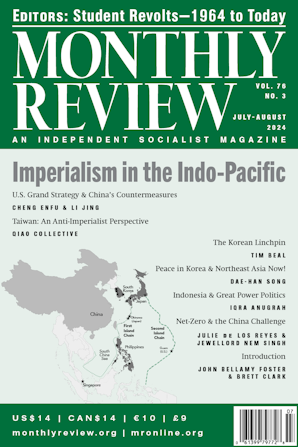Also in this issue
- Imperialism in the Indo-Pacific—An Introduction
- Changes in U.S. Grand Strategy in the Indo-Pacific and China’s Countermeasures
- Taiwan: An Anti-Imperialist Perspective
- The Korean Linchpin: The Korean Peninsula’s Enduring Centrality in U.S. Indo-Pacific Geostrategy
- Power Concedes Nothing Without a Demand: Peace in Korea and Northeast Asia Now!
- When the Ruling-Class Parties Harden: Indonesia and Great Power Politics in the Indo-Pacific
- Net-Zero and the China Challenge: Decarbonization amid Great Power Competition in the Indo-Pacific
Article by The Editors
- February 2026 (Volume 77, Number 8)
- January 2026 (Volume 77, Number 8)
- December 2025 (Volume 77, Number 7)
- November 2025 (Volume 77, Number 6)
- October 2025 (Volume 77, Number 4)
- September 2025 (Volume 77, Number 4)
- July-August 2025 (Volume 77, Number 3)
- June 2025 (Volume 77, Number 2)
- May 2025 (Volume 77, Number 1)
- April 2025 (Volume 76, Number 11)

